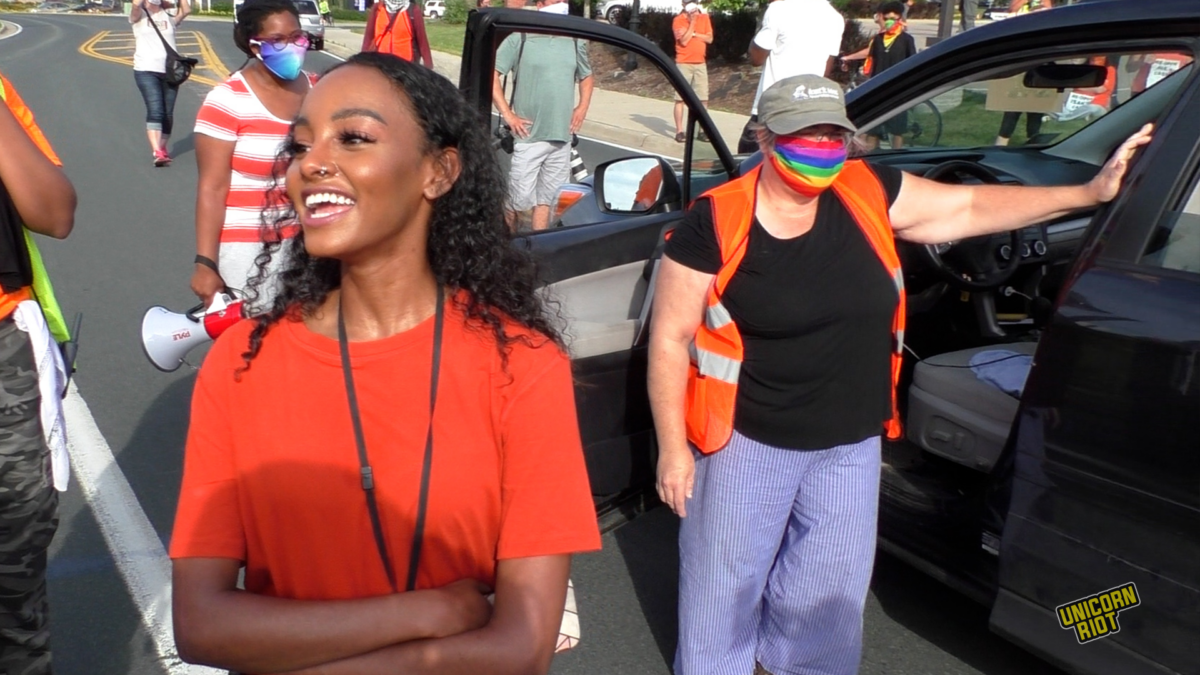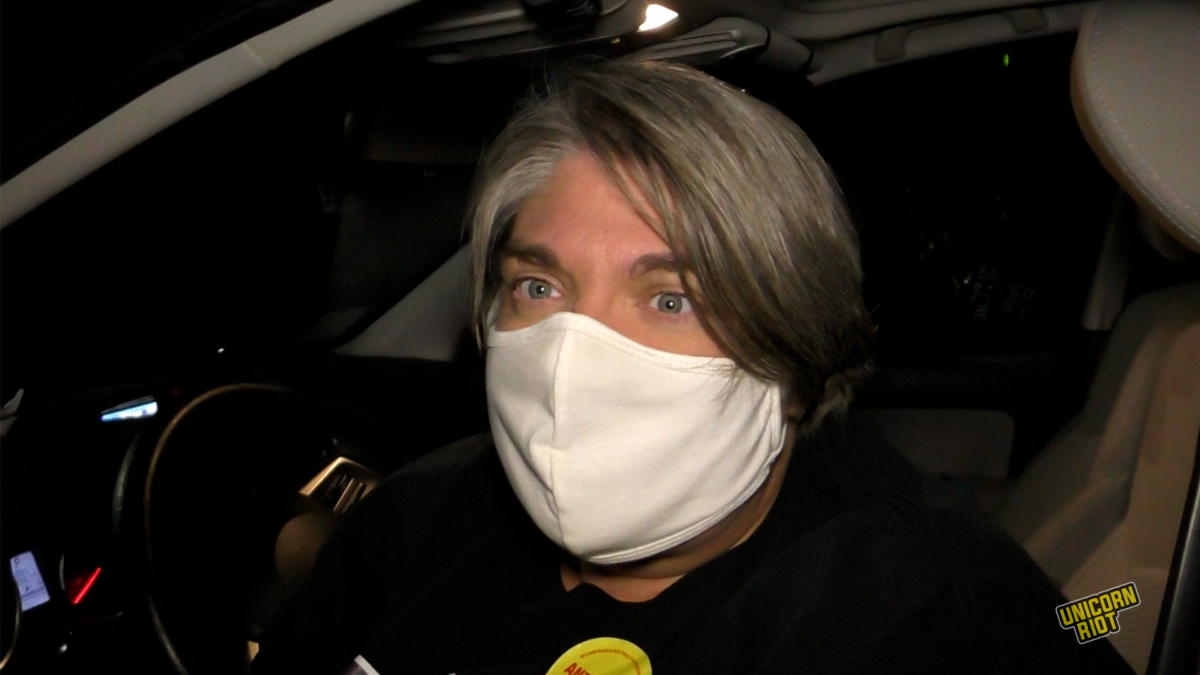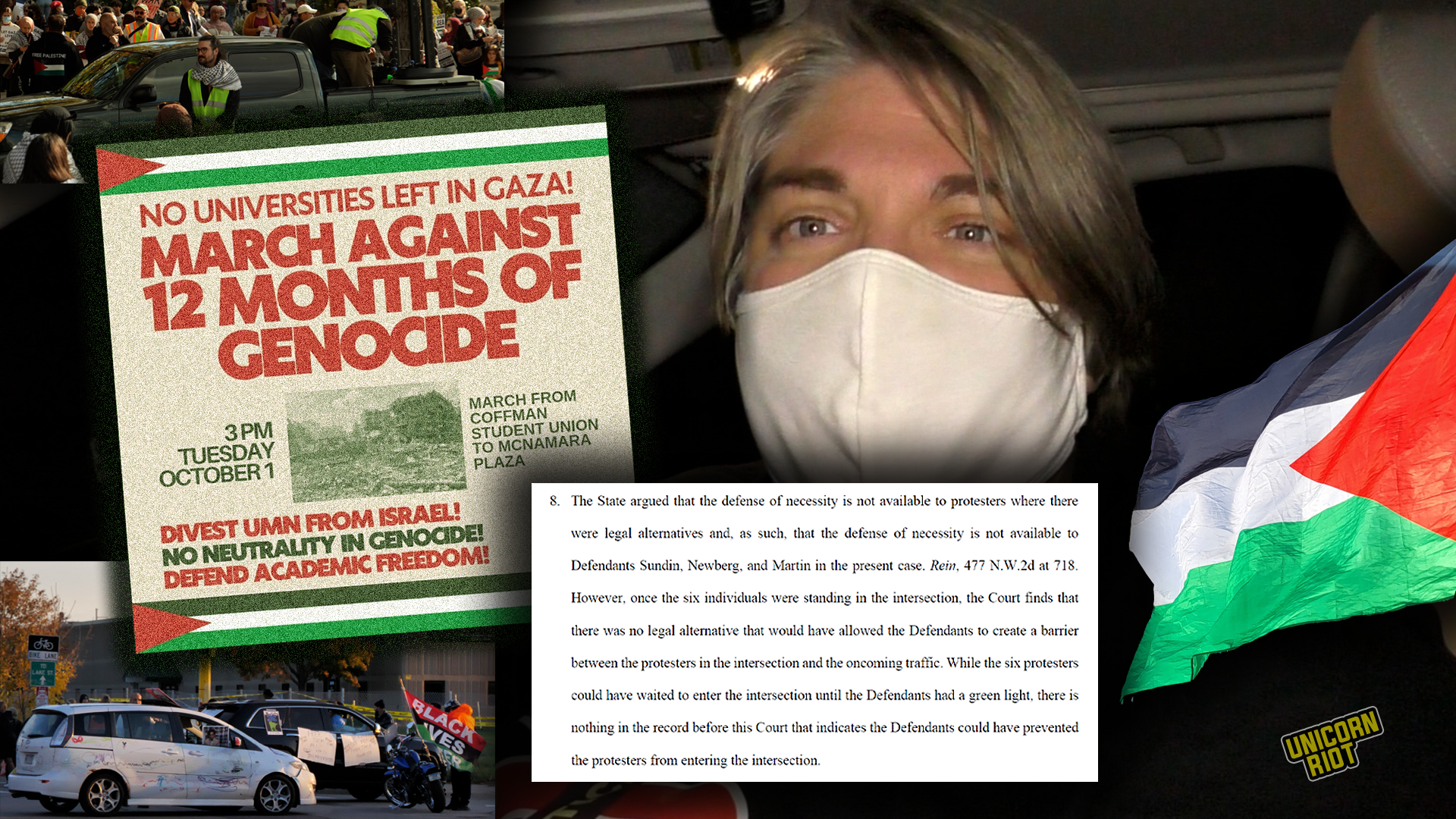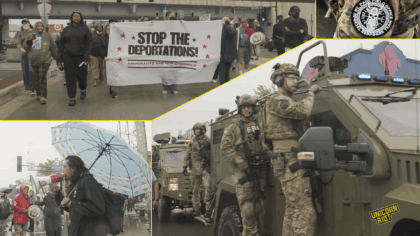Car Marshals Protecting Pro-Palestine Protest Acquitted in Minnesota Court
Minneapolis, MN — A judge recently acquitted three car marshals ticketed for positioning their vehicles to protect a pro-Palestine protest in Minneapolis on October 1, 2024. Judge Bev Benson ruled that Jess Sundin, Emily Newberg and Sarah Martin “had no legal alternative” and a justified “necessity” for their safety-led actions, finding them not guilty of the charged offenses (petty misdemeanors), noting that “there was a direct, causal connection between the Defendants breaking the law and preventing the harm.”
In this rare prosecution of protest car marshals in the Twin Cities, charges failing to stick is a win for the First Amendment, said victorious defense attorney Tim Phillips. He told Unicorn Riot that “criminalizing safety roles, such as a street medic or car marshal, makes protests more dangerous. We’re happy this ruling protects First Amendment rights.”
“We need car marshals and we can’t lose that protection because folks are worried about having to pay a ticket,” said longtime activist Jess Sundin, one of the three car marshals ticketed by officers from the University of Minnesota Police Department (UMPD). Sundin told Unicorn Riot she was “surprised” to be ticketed: “I’ve car marshaled hundreds of times and never been cited for it.”
The Need for Car Marshals
Car marshals use vehicles to lead and/or trail protests that take over streets, forming a physical barrier of protection between demonstrators and motorists. Protecting protests from physical violence by right-wing opposition as well as angry or oblivious drivers has become increasingly important in recent years. A rise in car ramming attacks and other vehicular incidents have killed several people and injured dozens over the last decade in the United States.
“Car marshals are our strongest defense against accidental or intentional attack from vehicles. We create a physical and visual barrier between car traffic and people in the roadway.
A hostile driver is less likely to risk damaging their own vehicle by hitting mine, so [car marshals] at least gives them pause. And when a driver is aggressively trying to get through or around a crowd, car marshals give protest organizers more time to move a crowd out of harms way, if needed.”
Jess Sundin, activist, organizer and car marshal acquitted at trial
Sundin recalled a series of incidents in the Twin Cities which intensified the need to have car marshals present at protests. In 2016, “St. Paul cop Sgt. Jeff Rothecker made a public social media post encouraging motorists to run over protesters. At least a year before that, a car ran through a crowd protesting the police murder of Michael Brown. In summer 2020, an oil tanker ran through a protest for justice for George Floyd on I-35, which was supposedly closed by law enforcement during the march. In June 2021, a motorist drove into a Minneapolis crowd protesting the police murder of Winston Smith, killing Deona Marie Knajdek.“
Rothecker, the violent cop whose racist internet trolling cost him his job, resigned from the St. Paul Police Department after the social media post drew criticism. No charges were brought against the driver who hit Ferguson solidarity protesters in Minneapolis in late 2014, nor were charges filed against the tanker truck driver who almost killed George Floyd protesters in 2020.
Cars being allowed to drive unimpeded onto roads where people are marching can, predictably, lead to deadly consequences. Anti-racist Heather Heyer was killed in the infamous Charlottesville car attack after the 2017 ‘Unite The Right’ neo-nazi rally and Summer Taylor was struck by a car and killed during a 2020 Black Lives Matter march in Seattle.
The driver who killed Deona Marie in Minneapolis was sentenced to 20 years in prison. The motorist responsible for Summer Taylor was sentenced to 6.5 years; a jury found the Washington State Patrol not liable in the circumstances of Taylor’s death on the interstate. Alt-right neo-nazi James Alex Fields was sentenced to life plus 419 years for his car attack that killed Heyer and injured dozens of others.
“Even friendly cars are a threat to pedestrians in the roadway, but car marshals are especially important because of the unfriendly ones,” Sundin told Unicorn Riot.

Cameras, Tickets, and a Trial Win
Each of the three car marshals ticketed faced one count of petty misdemeanor Impeding Traffic – Drive at slow speed (Minn. Stat. Sec. 169.15, subd. 1). One of the three was charged with a second count of petty misdemeanor Traffic Regulation – Driving Wrong Way on One Way Street (Minn Stat. Sec. 169.18, subd. 6(a)), which prosecutors dismissed during the trial.
“There were no issues or conflicts during the march,” Sundin said, “and there was no visible police presence at any time before the march ended and marshal cars went off to park. The other marshals got ticketed while parking, but they came for me more than an hour later, when after the closing rally I went back to my car to leave campus.”
Sundin says she felt targeted and retaliated against by the manner in which she was ticketed: “there were two squads involved in citing me — officers from one squad to deal with me, and the two cops from the other squad stood on the passenger side of my car, as if my passenger was being detained or something.”
The trial took place virtually over Zoom in late April 2025. The state called University of Minnesota surveillance video operator Jacob Dering and three UMPD campus cops – Sergeant Aaron Keller, Sergeant Jonas Hanggi, and Officer Caleb Arendt – as witnesses.
The defense called one witness, Ted Mika, a veteran activist and experienced protest marshal.
Four videos were submitted as state’s exhibits – three bodycam videos from police witnesses and footage from traffic cameras.
Sundin said during the trial she was alarmed by the surveillance capabilities, ease of use and clear definition of the University of Minnesota’s cameras.
“During the trial, I was really struck by the quality of the footage from surveillance cameras around the U of M. I learned that there are ‘operators’ who monitor the cameras live, and they have the capacity to move the cameras and to zoom in. Cameras that were hundreds of feet away from me were able to zoom in to the point that I was clearly identifiable! None of our ticketing officers witnessed our actions directly, and most were not watching the stream either.”
Jess Sundin
The three defendants agreed to argue a necessity defense, which Sundin said she was grateful for, especially after seeing the University’s surveillance footage.
“Our attorney made the case that there was no safe and legal way for us to not follow behind the crowd once they were in the streets,” she said. “One after another, prosecution witnesses conceded that this was the case. Further, we had a witness with years of experiences coordinating marshals at protests, who made a clear and strong case for the need for car marshals to keep our people safe.”

Judge Affirms Protecting Protests with Cars: ‘The Nature of the Protest is Irrelevant to the Court’s Analysis’
Judge Benson wrote in her ruling that the car marshals protected pedestrian protest marshals taking the street on foot – who were first deployed to the street before the main group of protesters arrived – and had “no legal alternative” to ensure everyone’s safety. Benson wrote: “it appears to the Court that the Defendants acted to protect the six individuals who entered the intersection first in addition to the large group of protesters who entered the intersection.”
“The Court finds that there was no legal alternative that would have allowed the Defendants to create a barrier between the protesters in the intersection and the oncoming traffic.”
Hennepin County Judge Bev Benson in her ruling acquitting the car marshal defendants
The protest on Oct. 1, 2024 was organized by pro-Palestine and student groups to speak out against a year of Israel’s genocidal war on Gaza. A graphic promoting the event with the Students for a Democratic Society logo states, “No Universities Left in Gaza! March Against 12 Months of Genocide” and “Divest UMN From Israel!,“ “No Neutrality in Genocide!,“ and “Defend Academic Freedom!”

Pro-Palestine protests have repeatedly been subject to attacks across by counter-protesters since late 2023, not to mention law enforcement. Two examples of the dozens of attacks on Palestine solidarity events are the scary car incident in October 2023 in Minneapolis and among many violent attacks, the undeterred pro-Zionist mob violence against peaceful pro-Palestine students at UCLA on April 30-May 1, 2024.
The fact that the car marshals were protecting a pro-Palestine protest may have played a role into why they were ticketed by police, but the court said “the nature of the protest is irrelevant to the Court’s analysis.”
Judge Benson ruled the “three drivers acted to protect pedestrians on the road” and found the defendants “not guilty by reason of necessity.”
“We chose to fight these tickets not because the penalty was beyond our means to pay,” Sundin said, “but rather to assert our rights in court in hopes of discouraging law enforcement from taking such actions.“
Read the 10-page court ruling here.
Sundin had a similar encounter with law enforcement when she was car marshaling and cited and released as part of the largest mass arrest in recent Minnesota history on November 4, 2020. Sundin’s charges from 2020 were ultimately dropped. “Everyone was cited for being ‘a pedestrian on a highway,’ so car marshals’ tickets were dropped when challenged in court,” she said.
Back in 2010, Sundin’s home was raided by the FBI as part of a nationwide “witch hunt” targeting anti-war and Palestine solidarity activists. She was never charged with any crime after the raid.
EDITOR’S NOTE: In 2024, in response to student protests, the University of Minnesota disclosed that around $5 million of its endowment is invested in Israeli companies or U.S. companies profiting from enabling Israel’s genocide in Gaza.
Follow us on X (aka Twitter), Facebook, YouTube, Vimeo, Instagram, Mastodon, Threads, BlueSky and Patreon.



